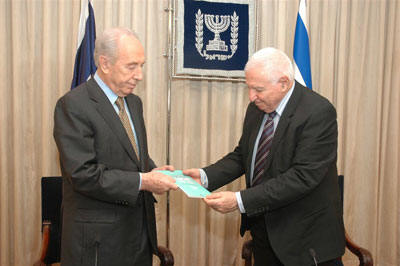United Nations names Saudi, Abdulaziz
Arrukban,
as envoy for coordinating Middle East relief efforts
UNITED NATIONS (Press Release)—The United Nations humanitarian chief today welcomed the recent appointment of a special envoy tasked with ensuring there is more effective coordination between UN relief efforts and those of governments and aid groups in the Middle East and North Africa.
Abdulaziz bin Mohamed Arrukban of Saudi Arabia became the Secretary-General’s Special Humanitarian Envoy on 10 July, with a special focus on building partnerships for disaster response. His initial appointment is for one year.
Mr. Arrukban was previously Special International Ambassador for the UN World Food Programme (WFP).
John Holmes, Under-Secretary-General for Humanitarian Affairs and Emergency Relief Coordinator, said Mr. Arrukban brought extensive knowledge to the post.
“I expect that his renewed commitment to
work with the United Nations will be of great benefit to the humanitarian
community and especially to the suffering people we serve,” he said in a
statement.
The preceding story was provided by the
United Nations
 Letter from Jerusalem By Ira Sharkansky |
Will world
leadership pass from the U.S. to another power?
JERUSALEM—We cheered, or at least sighed with
relief when the Berlin Wall came down along with other indications
that the Soviet Union and the Cold War were passing into history.
It has, for the most part, been a good twenty years with the United States of America as the primary world leader.
Many of us are living better and longer, the European Union has taken hold and expanded, China and India are leading beneficiaries of globalization, and the brightest spots in what we had been uniform Third World misery.
However, on two fronts now affecting many of us, American political and economic leaders have performed as badly as any could have feared.
The invasion and occupation of Iraq was anything but a work of governmental genius. No weapons of mass destruction; no connection with 9-11; no signs of democracy coming out of the civil war the Americans have produced. There is an increase of Islamic vengeance and crusades against America, the West, and anything Christian or Jewish.
Now we are paying the price of American economic genius. Lots of entrepreneurs piled onto the idea of making money by handing out mortgages to people who might not have the capacity to pay them back, especially when something would disturb the prospect of ever-increasing real estate values. Could not all those money managers, being paid salaries and bonuses of millions per year, learn anything from the dot.com frenzy of a few years earlier? It might be a stretch to expect them to connect their enthusiasm for junk mortgages with the Dutch tulip frenzy of the 1630s.
Part of the genius involved in the most recent investment craze is to hive off, package, and distribute the risks in a variety of ways that only a super genius can understand. For the rest of us, it means a worsening of the crash as it spreads to financial institutions participating in the protective mechanisms around the world. Some of our pension funds may have enjoyed the party without realizing the risks they were buying. The number and complexity of the instruments complicates any reckoning of how great the damage, and how long it may take for the banks, governments, and other lofty institutions to calm the markets.
One day the Americans will put a fig leaf on their departure from Iraq. My guess is that a program of Iraqization will create an authority that will last long enough for the final Marine to leave. Sooner or later someone like Saddam Hussein will emerge to impose order. It will not be pretty. Decent people all over America will cluck their tongues in expressions of regret, dismay, or sorrow. Some may feel a sense of responsibility for the losses suffered, and the gains not realized between Saddam I and Saddam II.
The economic crisis linked to sub-prime mortgages may pass more quickly. In the process we can expect media coverage of pensioners trying to make do on reduced incomes, and once-proud homeowners living rough.
Should we think beyond the era of American leadership and aspire to another great power?
China is not ready. When it is, our children or grandchildren can hope that it has passed beyond the nastiness of repression, and the lack of interest in health and safety. A world leader cannot sell toys with dangerous magnets or lead paint.
Western Europe is an attractive model. It works hard to keep itself clean, healthy, and safe. Its cities function for visitors and natives. Small towns are scenic and viable. Main roads are free of potholes, and public transportation is worth copying. Industries pay African countries to take their toxic waste. Vacation packagers send middle- and working class customers to resorts in the pretty spots on the outskirts of places where most of them would not like to live. Governments give money to organizations representing a wide range of what someone thinks is politically correct. The Danes have apologized to the Irish for what the Vikings did to them.
Except for lip service and some money, Europeans do not seem to care what happens outside of itself. Members of the European Union do not aspire to be world leaders, and do what they can to minimize the power of any other country that would lead.
The European model is not perfect, but it is no worse than the Americanization of Iraq or sub-prime mortgages.
What does this mean for the Jews?
We have accommodated ourselves to a long list of imperial powers. Usually we have done well and survived, as well as suffered.
As far as we can see into the future,
Israel will do as the Americans desire, or at least some of what
they desire while avoiding more danger than we can tolerate. We also
cozy up to the Europeans. We continue to require English of our
students, and offer courses in French, German, Spanish, Russian,
Arabic, and Chinese.
(Return to
top)
BEYOGLU, Turkey—Israeli teenage volunteers from the Medical Cadets Health Organization spent the week of 6-11 August in Turkey, at the invitation of the mayor of Beyoglu. They stayed at a summer camp sponsored by the city, where they gave a lecture about first aid to local teenage volunteers. The Israeli group was made up of three Arab Israeli teenagers, Muslims and Christians, from Jaffa and Lod, accompanied by a guide.
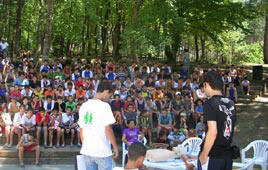 The
Israeli teenagers were received warmly by their Turkish hosts,
arousing curiosity among the campers who came from Istanbul and two
cities in Anatolia, a region with a very traditional population. The
Israelis were asked many questions about daily life in Israel and
did not encounter any hostility whatsoever. The camp organizers
praised the Israeli teenagers and their work with the Turkish youth
in first aid training.
The
Israeli teenagers were received warmly by their Turkish hosts,
arousing curiosity among the campers who came from Istanbul and two
cities in Anatolia, a region with a very traditional population. The
Israelis were asked many questions about daily life in Israel and
did not encounter any hostility whatsoever. The camp organizers
praised the Israeli teenagers and their work with the Turkish youth
in first aid training.
The
Medical Cadets Health Organization, a project unique to Israel,
involves teenagers who receive basic medical training and volunteer
as paramedics in hospitals and ambulances throughout the country.
The young (ages 10-18) volunteers become "Health Ambassadors" in
their communities and in communities abroad to which they are
invited, advancing health education locally and worldwide.
During the missions abroad, the teenagers learn about each other's
cultures and form contacts that could turn into lifelong
friendships. In addition to the recent visit to Turkey, the
organization has sponsored several successful missions to India.
The preceding story was provided by Israel's Ministry of Foreign Affairs
Commentary
Intra-Palestinian fighting dangerous for Israel
By Shoshana Bryen
WASHINGTON, DC (Press Release)—The Miami Herald reports, "Tourism to Israel is on an upswing, with officials predicting a 10 to 20 percent increase... The reasons, say security experts, are a cease-fire between Israel and some Palestinian groups, and the security fence..."
Yes, Israel is a safe place for travel and tourism because the Israeli government and the IDF protect the people. But around Israel - with implications for Israel - the Palestinian war has taken on dimensions unreported in the American press because it isn't news when Palestinians kill one another. A well-placed source reports from Ramallah, "The situation from the Fatah perspective is the following: a growing determination among Fatah cadres to avenge the humiliation they absorbed in Gaza. What Hamas did to them touched their sense of dignity and they talk now about taking back Gaza by force."
Palestinian "humiliation" is nothing to toy with - much of the unrestrained violence in the region is the result of perceived humiliation at the hands of one or another enemy. Fatah has asked the United States for a new military training base in Bethlehem rather than using its almost new training base in Jericho. Abu Mazen has said it would be symbolically important to be located in a central Palestinian city (next to Jerusalem). Thus far, Washington has declined, but has agreed to an infusion of arms and capabilities for Fatah forces.
Hamas isn't waiting to be attacked. Middle East News Line (MENL) reports, "Hamas has been waging a silent war in the southern West Bank. Palestinian Authority (PA) security sources said Hamas has established operational and reconnaissance cells that targeted Fatah and PA figures in the southern West Bank (attacking) key PA figures, particularly security commanders. Hamas has been waging revenge attacks against the PA in wake of Fatah-ordered sweeps of Islamic strongholds... Palestinian sources said Hamas has warned PA forces to halt their crackdown on the Islamic movement (and) threatened to escalate attacks."
Hamas has also organized naval vessels off the Gaza coast - presumably for smuggling under the unlikely circumstance that Egypt makes it harder for them to use the tunnels they have been expanding under the Rafah border. Hamas has destroyed the Fatah infrastructure in Gaza, purging the civil service, including hospitals and schools, of Fatah members and replacing them with Islamist loyalists.
Fearing the strengthening of Islamist groups among Palestinians in Lebanon, the PLO has reshuffled military commanders there amid plans to extend its authority from central to southern Lebanon.
It sounds like preparations for war - a war that will inevitably involve Israel, as MENL reported Israeli and PA commanders meeting on a weekly basis to coordinate and divide security responsibility in large areas of the West Bank. The sources said PA security units have been given freedom of movement in and around Palestinian cities.
Understanding that much of Palestinian violence is posturing for
political purposes, it should be noted too that Abu Mazen this week
called for a "return to national unity" with rival Palestinian factions
and, for the first time since Hamas took over the Gaza Strip in June,
said the split was "temporary."
The preceding story was provided by the Jewish Institute for National
Security Affairs
JERUSALEM (Press Release)—The day after a magnitude-8 earthquake devastated
the southern coast of Peru, killing at least 510 people, Israeli President
Shimon Peres sent a telegram to Peruvian President Alan Garcia offering the
Jewish state’s assistance, The Jerusalem Post reported.
The president’s office is currently reviewing how Israel can most
effectively assist the Peruvian people. Meanwhile, the Foreign Ministry
transferred $20,000 to the Israeli Embassy in Lima for the purchase of
blankets and tents for the earthquake victims. Israel has, throughout its
history, reached out to victims of natural disasters around the world.
The preceding story was provided by the American Israel Public Affairs
Committee
.
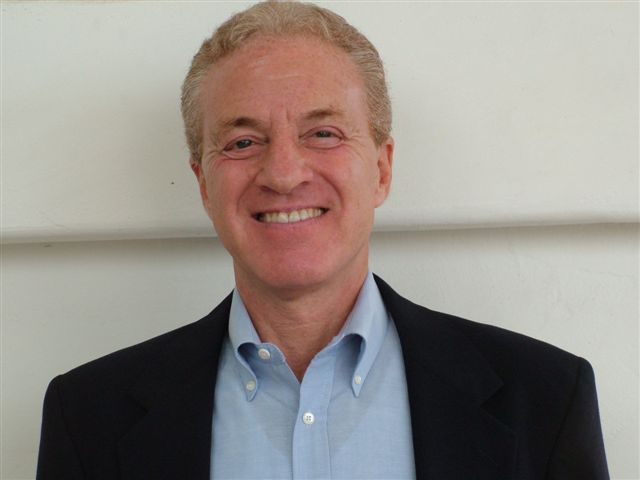 Freedom
at Issue Freedom
at IssueBruce Kesler |
Davis bill risks making partisan issue of UCMJ
ENCINITAS, California—There’s as much division in Congress today over Iraq
and what kind of, if any, war the U.S. is in as there was in the early ‘70’s
over Vietnam. What’s different is the extent to which the divisions now
exhibit themselves cloaked in legal process arguments.
The causes are several: New types of enemies, clearly not part of a anything close to a conventional national military; The increased sway of lawyers throughout our society and their priorities for process over defense; and, the decline in military veterans among our senators and congressmen, at the lowest point since during World War II, resulting in less sensitivity to internal military concerns.
I have described elsewhere the intrusion of an inadequately trained Judge Advocate General corps into rules-of-engagement issues.
The arguments over how to deal with enemy detainees is the most prominent example. Some argue for complete access to U.S. courts and procedures, though detainees are not U.S. residents and the nature of battlefield or intelligence information and capture cannot by nature approximate domestic police arrest nor can battlefield or intelligence evidence be as certain or open as in domestic cases.
The Bush administration sought to treat such detainees as outside ordinary U.S. judicial procedures, through military commissions. A majority of the Supreme Court in 2006, in Hamdan v. Rumsfeld, found these procedures inadequate, primarily for not being specifically enough authorized by Congress, which has that authority.
Some in Congress argued for full access by “alien unlawful enemy combatants” to U.S. civilians’ courts and rights, or via the U.S. military’s Uniform Code of Military Justice (UCMJ). The considerations of the nature and locale of the detainees, and of the evidence and procedures that are appropriate to fairness and national security, led to the Military Commissions Act of 2006. Many procedures are based upon UCMJ. Of note is that the process includes appeal to the U.S. District Court in D.C. and from there to the Supreme Court. It does not include habeas corpus challenges by detainees to the U.S.’ right to detain or try them.
In the Senate, the vote was 65-34, all but one opposed being Democrats. In the House, the vote was 250-170, all but seven opposed being Democrats.
With the increase in number of Democrats in the current Congress, and their control, like bills have been introduced by Democrats in House and Senate to amend the Military Commissions Act. (HR 1415 and S576; details here) Most notably, the bill would allow habeas corpus challenges by detainees to their detention or trial, and “provide for expedited judicial review of civil actions that challenges any provision of the Military Commissions Act of 2006.” It would, also, “include as War Crime offenses the denial of trial rights.”
In effect, the operations of the military
commissions would become utterly bogged down in a multitude of legal
challenges.
(Jump to continuation)
Please click below to read more about San Diego Jewish Academy, the premier K-12 day school in Carmel Valley

 Rabbi
Baruch Lederman Rabbi
Baruch Lederman
Amazing tales of Judaism |
D'Var Torah - Parshas Shoftim
How a simple
kindness foiled an anti-Semitic plot
SAN DIEGO —Shoftim (judges) in the Jewish court must be unyielding in upholding
the strict law of the Torah. At the same time they must be compassionate people.
Mercy, compassion and justice are vital traits as the following true story
illustrates:
Rabbi Yechezkel Landau, known as the Noda B'Yehudah, was Rabbi of Prague. He
once saw a non-Jewish boy crying on the street. The boy told him that his
stepfather, one of the bakers of the city, had sent him to sell a basket
of loaves of bread. He had sold all the loaves but had lost the money, and he
was afraid to go home because his cruel stepfather would beat him mercilessly.
He didn't know what to do or where to turn. The Rabbi gave the despondent lad
the necessary sum out of his own pocket.
Many years later, the Rabbi heard a knock on his door. He opened the door and
found a non-Jewish man waiting for him. The Rabbi couldn't imagine what this
strange man
wanted with him.
"I am the little boy who sat and cried many years ago, and the Rabbi in his
great kindness and generosity saved me then from my stepfather's anger. I have
come now to repay that good deed. The bakers of the city are planning a terrible
plot for the holiday of Passover. Since after your holiday, the Jews buy bread
from non-Jews, the bakers agreed to poison all the loaves of bread that would be
sold to the Jews. I have come to warn you ahead of time of this plot. I must
leave quickly. It is dangerous for me to be here with you."
The Rabbi thanked him profusely for his warning and began planning what to do in
order to foil the anti-Semitic bakers' plot. If he went to the authorities, the
bakers would just deny everything.
During the entire holiday, the Rabbi kept quiet. On the eighth night of the
holiday, the Rabbi sent messengers for everyone to gather in the main shul the
next morning. There, the Rav would address the entire community. Every Jewish
resident of Prague obeyed the Rav's orders and appeared at the appointed time in
the main shul.
"A mistake was made this year in our calender calculations and we started Pesach
a day early," the Rabbi of Prague announced to the astounded community,
"Therefore,
tomorrow is a holiday. We must still eat matzah and may not eat chometz
(bread)."
All the members of the community, albeit shocked, adhered to his words without
question.
At the end of the holiday, the bakers could not understand why the Jews weren't
buying their bread as they did every year. Instead, policemen came and caught
the bakers red
handed. Seizing their loaves of bread as evidence, they arrested the plotting
bakers and threw them into prison.
Dedicated by Dr. Gersham & Chava Stein & Family.
(Return to top)

Click the ad above to go to the "I'm there for you baby" website
|
 Torah
on One Foot Torah
on One FootBy Rabbi Leonard Rosenthal Tifereth Israel Synagogue, San Diego
|
God
cares more about our deeds than our thought
SAN DIEGO—I recently met with someone who is considering
conversion to Judaism who shared with me some of the
conversations he has already had with other rabbis. Some of the
things they said about Judaism troubled him. When inquiring
about Jewish theology and belief systems he was surprised to be
told that one can believe almost anything one wishes and still
be Jewish.
I think I also surprised him by agreeing with that assessment. Judaism is restrictive when it comes to behavior. Judaism gives its followers a great deal of latitude when it comes to belief. To put this in more familiar terms: God cares more about what we do than what we think.
The Midrash contains an extreme statement of this view. Midrash Eicha quotes God as saying: "If only [Israel] would abandon me but follow my Torah [I would be satisfied]. (Peticha Eicha) That is, God finds more delight in Jews following the mitzvot than in their faith in Him. This is rather radical theology but it is typical of Jewish thought. Judaism has always been more concerned with behavior than belief.
Rabbi Nachman of Bratslav used this teaching from Midrash Eicha not only to emphasize action over thought but to critique Jews who engage in theological inquiry. He said that what God meant in Midrash Eicha was that God would be happier if Jews gave up metaphysical inquiry and their attempts to understand God’s relationship with the world and concentrated instead on studying and observing the Torah in simplicity and wholeheartedness. This, Rabbi Nachman taught, is what the Torah means when it says in Parshat Eikev: "One should be wholehearted with the Lord your God." (Deut. 18:13) Don’t spend too much time investigating and researching the Torah, do what it says instead! (Iturei Torah, Devarim, 121)
However, there is one major caveat to Judaism’s general rule that God is more concerned with what one thinks than what one does: one’s actions must stem from a basic belief that God exists and that God places behavioral and moral demands upon our life. Unless one believes in a commanding God who sets the standard for good and evil, morality becomes relative and every behavior permitted.
We Jews find God’s commanding voice in the Torah and its mitzvot. The Torah is not only a Tree of Life for those who cling to it, it is also the blueprint for living a productive, moral, and holy life.
(Return to top)
The Jewish Grapevine

|
CYBER-REFERRALS
— Israel's
Consulate
General
in Los Angeles
forwards a story
from Haaretz
describing a
spat betwen the
Saudi Arabians
and the Syrians
regarding their
respective roles
in the Middle
East. Here
is
a link....
Jay Jacobson
forwards a
column by
Mehdi Khalji for
the Washington
Institute for
Near East Policy
examining the
role of Iran's
Revolutionary
Guards, an
organization
expected to soon
be put on the
U.S. list of
proscribed
terrorist
organizations...
Hillel
Mazansky
found a YouTube
presentation
from earlier
this year about
a black Jewish
congregation,
Beth Shalom, in
Chicago.
Video shows
portions of the
service.
It is below,
along with
another video
production
showing an
Ethiopian Jewish
service in Safed.
.... The
Republican
Jewish Caucus
has sent around
approvingly a
column by
Michael Medved
wondering why
Hollywood has
chosen in the
movie,
September Dawn,
to release a
movie dealing
with Mormon
terrorists of
the 19th
century, rather
than making one
about Islamic
terrorists
today.
Could this have
something to do
with the fact
that one of the
leading
Republican
presidential
candidates, Mitt
Romney, is
Mormon? ....
. .
.
|
____________________  The
Jewish
Citizen The
Jewish
Citizen
by Donald H. Harrison |
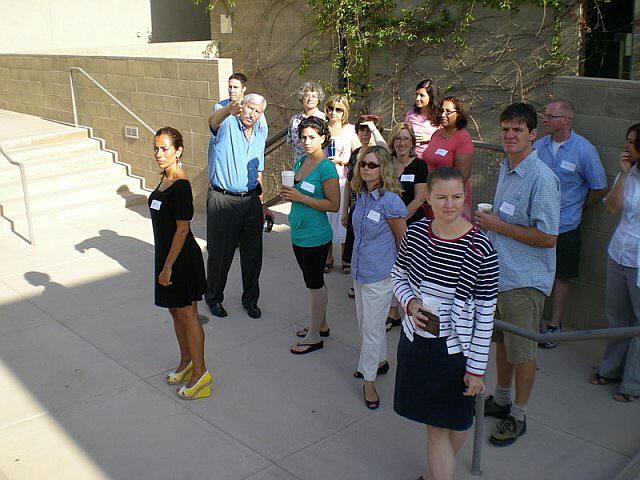
building during a tour of the campus for new teachers and staff. Donald H. Harrison photos
SDJA secular teachers taught basics of Judaism
SAN DIEGO—There's a lot to learn if you are a new teacher, particularly if you are coming from a secular school to a Jewish day school. Although you may still be teaching the same secular subjects, like science, or math, or American history, there are many new concepts that need to be learned—concepts that require a Jewish vocabulary.
So, Larry Acheatel, the executive vice president of San Diego Jewish Academy, and Debbie Kornberg, director of Judaic Studies for the lower school in the K-12 institution, conducted a cram course for new teachers today. As I will be instructing a journalism class at SDJA when the term begins at the end of this month, I had the opportunity to attend. Even though I, as a Jew and a longtime Jewish journalist, knew the concepts, I found myself utterly fascinated by the orientation process.
Acheatel started by saying that San Diego Jewish Academy is a "pluralistic community day school." The "day school" part was easy; it's a school that is taught over the whole day (as opposed to an afternoon supplementary school), and its curriculum includes both secular and Judaic studies. But what about "community" and "pluralistic"?
"We strive to serve a wide spectrum," Acheatel explained. "We have students of all stripes" of Judaism ranging from non-observant to very observant. Some students may come from homes where Jewish dietary laws are strictly observed; others from homes where they are not. Some students may follow Orthodox ritual; others may be used to the rituals of the Reform, Reconstructionist, or the Conservative movements. The school acknowledges and respects the traditions of all these movements within Judaism.
On a tour of the campus, Acheatel pointed out a mehitzah, a curtain that divides males from females during prayer. He explained that as students come from various movements, there are different settings in which they may pray. The divider accommodates Orthodox custom, but elsewhere on the campus, there is a place for boys and girls to pray together according to the egalitarian customs of the non-Orthodox movements.
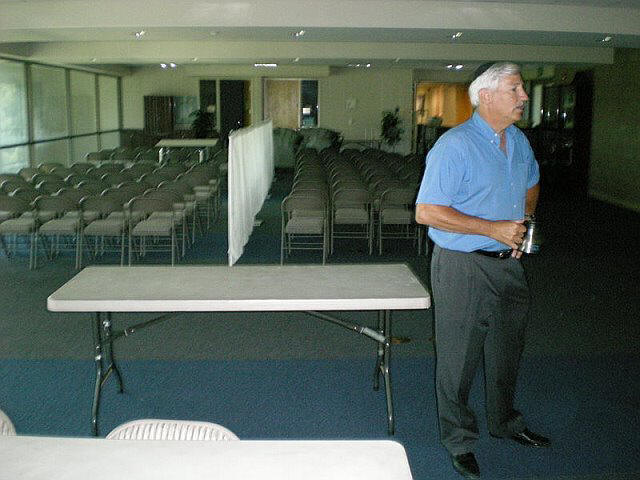 |
MEHITZAH—Larry
Acheatel, executive vice
president of San Diego Jewish Academy, explains the function of a mehitzah, the curtain diving the seating area behind him during orientation for new teachers |
By "pluralistic," Acheatel added, he
means to say that although the
students are Jewish, they come from
many different countries of origin.
Often they have incorporated into
their Jewish lifestyles the customs
of their native countries—whether
they be from Mexico, South Africa,
Israel, France, Canada, or the U.S.
Before turning the program over to
Kornberg, Acheatel asked
rhetorically what the purpose of a
day school is—why even have such an
institution? He then responded that
the pluralistic Jewish community
desires that the "children be
literate about Jewish culture and
values... and that they incorporate
them into their lives." The
school tries to teach the concept
that one of God's
mitzvot
(commandments)
is the duty of
tikkun olam
(repair of the world).
It's important, he added, not only
to train children for successful
lives, but to instill in them values
so that they will do something
positive as successful people.
| Debbie Kornberg, director of Judaic studies for the lower school of San Diego Jewish Academy, explains some basic Jewish concepts to new teachers who will be teaching secular subjects this upcoming term. Among these were the rules of kashrut, the notion of Tikkun Olam, and the concept of being a mensch. |
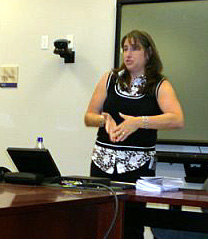 |
Kornberg explained to the teachers
that Jewish dietary laws
(kashrut)
separate food into three groups:
meat, dairy and pareve
(neutral). Meat and dairy can
never be eaten together but
pareve can be eaten with either
of the two other groups.
Pareve foods include vegetables,
fruit and fish.
San Diego Jewish Academy is a kosher
campus, she said. That means
that any food served on campus is
kosher. You won't find a
cheeseburger anywhere on the campus.
If teachers bring food from home for
lunch, they must limit themselves to
dairy or pareve foods, and no
meats (including poultry). To
make the rule uniform, this applies
even to teachers whose own homes are
kosher.
Kosher meat lunches are served on
campus Tuesdays and Thursdays.
What teachers eat off-campus is
their own business. However,
if teachers take students on a field
trip during which meals will be
purchased, unless the restaurant is
a kosher establishment, students and
faculty may only purchase dairy or
pareve meals.
In the event that a teacher brings
in treats for a birthday party or
other celebration, all foods must be
individually wrapped items with the
wrappers bearing a hechsher
(certification of being kosher).
She distributed a booklet showing
the various kosher symbols.
When Shabbat falls, San Diego Jewish
Academy is a closed campus.
Teachers may not come on campus to
"catch up" on their work. Nor
may they access the campus computers
from their homes. Shabbat, the
day of rest, is observed.
Before Kornberg completed her
segment, she recited a list of five
Hebrew and two Yiddish words or
phrases that are commonly used on
the campus and with which teachers
should become familiar if they are
not already.
The Hebrew: Tikkun Olam; mitzvah;
tzedakah (doing justice, as in
giving charity); Torah (the
first five books of the Bible);
and Tefilah (prayer).
The Yiddish: daven (to worship)
and mensch (an upright
person.)
It's a good starting-point list,
wouldn't you agree?

Beth Am plans for Labor Day picnic, shmoozefest
SAN DIEGO (Press
Release)—Congregation Beth Am, a
Conservative synagogue located off
the 5 and 56 freeways in Carmel
Valley, is planning an Annual Labor
Day Picnic for current, new and
prospective members.
The free picnic will be held on
Monday, September 3, from 11:30am to
2 pm at Ashley Falls Park (on the
corner of Del Mar Heights Road and
Ashley Falls Drive). Rabbis, staff
and lay leadership will be on hand
to participate in a kaosher BBQ,
soccer, softball, relay races, Astro
Jump, clowns, music and fun for all
ages!
Six days later, on September 9, Congregation Beth Am will present its first Annual Business Schmoozefest from 8:30am to noon.
The event at the synagogue at 5050 Del Mar Heights Road is intended to introduce attendees to the latest and greatest services, to get new ideas, discover new resources and attend a great program on Business Ethics. Organizers are promising fabulous food, a great program, and prize drawings- All free of charge!
Businesses desiring to exhibit may contact Debra at (858) 481-8454 or debra@betham.com. Additionally, she may be contacted by the public for information about either event.
The preceding story was based on information provided by Congregation Beth Am

News from the Israel Baseball League |

and earning a place in Sunday's IBL championship game against the Bet Shemesh Blue Sox.
Yechiel Jonathan Stein photo
Injury-ridden semis leave Bet Shemish, Modi'in to vie for IBL's inaugural championship game Sunday
By Andrew Wilson
KIBBUTZ GEZER, Israel (Press Release)— After today’s nail biting semi-final action, the Modi’in Miracle will take on home field rival, the Bet Shemesh Blue Sox, in the inaugural IBL Championship game.
At Sportek in Tel Aviv, the third-seeded Modi’in Miracle upset the second-seeded Tel Aviv Lightning, 4-2, with much of the damage occurring in the first inning. Tel Aviv suffered a huge blow in the third at bat of the game when first baseman Stewart Brito suffered a broken nose from a wild throw by teammate SS Raul Franco, forcing Brito to leave the game.
On Franco’s throwing error, Modi’in shortsop Adam Harwood came in to score the first run of the game. The Lightning ran into some more bad luck when rightfielder Jeff Hastings got his arm stuck in the right field fence trying to chase down a fly ball hit by catcher Eladio Rodriguez.
Hastings was charged with an error on the play, allowing Modi’in first baseman Aaron Levin to score the second run of the inning.
The Lightning scored two runs in the bottom of the fourth inning to bring them within one run, on a RBI double by left fielder Josh Matlow and a RBI single by first baseman Sam Marthinsen. Modi’in added an insurance run in the fifth inning on a home run by second baseman Noah Walker (2-for-4) to put the Miracle up 4-2.
Modi’in left-handed pitcher Matt Bennett earned the victory throwing a complete game,
allowing two runs on four hits with five strikeouts. Left-handed pitcher Aaron
Pribble of Tel Aviv recorded the loss, despite pitching a complete game, allowing only one earned run on the day. The usually steady Tel Aviv defense let them down today, committing four errors, allowing three unearned runs to score.
Here, At Gezer Field, the Bet Shemesh Blue Sox defeated the Netanya Tigers, 6-3, battling back three times from one run deficits to earn the win. Netanya jumped out to a one run lead on a bases loaded RBI single by catcher Sam Faeder off Bet Shemesh right-handed pitcher Juan Feliciano. The first inning run was bitter-sweet for the Tigers, because outfielder Josh Doane, the Tigers’ top hitter, was forced to leave the game due to a leg injury.
Bet Shemesh answered back with a solo home run by SS Gregg Raymundo (2-for-2) in the bottom of the first inning. The Tigers took the lead in the top of the second inning, on a sacrifice fly by outfielder Ben Engelhart. Netanya was hit with another injury when starter right handed pitcher Leon Feingold was forced to leave with a back injury during the bottom of the third inning. Israeli RHP Shlomo Lipetz replaced Feingold,
retiring one batter before giving up Raymundo’s second solo home run of the day, tying the score at two apiece.
After the Tigers scored one more run in the top of the fourth inning, the Blue Sox answered back with a two RBI ground rule double by first baseman Ben Pincus. The play was originally ruled a home run, however, after a long conference amongst the umpires the call was changed to a ground rule double. Bet Shemesh added two more runs in the fifth inning and starting pitcher Juan Feliciano held the Tigers scoreless
for the last three innings. Feliciano recorded the win pitching a complete game, allowing three runs (one earned) on five hits with six strikeouts.
Sunday at 6 pm at Yarkon Field in the Baptist Village in Petach Tikva, Art Shamsky’s Modi’in Miracle will play Ron Blomberg’s Bet Shemesh Blue Sox in the IBL’s inaugural Championship game. The pitching probables for the game feature Dominican RHP Maximo Nelson (5-3, 3.55 ERA) for Modi’in and Californian right-handed pitcher Rafael Bergstrom (7-2, 2.44 ERA) for Bet Shemesh.
After the conclusion of the game, IBL Commissioner Dan Kurtzer will present the winning team with the championship trophy. Commissioner Kurtzer will also be presenting the IBL’s top players with end of season awards.
Summaries:
1 2 3 4 5 6 7 R H E
Modi’in 2 0 1 0 1 0 0 4 6 0
Tel Aviv 0 0 0 2 0 0 0 2 4 4
W: Matt Bennett (1-0); L: Aaron Pribble (0-1); HR: Noah Walker
1 2 3 4 5 6 7 R H E
Netanya 1 1 0 1 0 0 0 3 5 0
Bet Shemesh 1 0 1 2 2 0 x 6 7 1
W: Juan Feliciano (1-0); L: Shlomo Lipetz (0-1); HR: Gregg Raymundo (2)
The preceding story was provided by the Israel Baseball League



{Marc Kligman, who combines being a sports agent with his life as an observant Jew, invites you to listen. Click on the ad above for more information}.
 People
of the Books People
of the Books |
Novel
on Jews of Iran under ayatollahs
praiseworthy
The Septembers of Shiraz
by Dalia Sofer; Ecco (Harper
Collins}; 340 pages; $24.95.
Reviewed by Norman Manson
The place: Tehran; the time:
1981-82, with Ayatollah Khomeini and
his Revolutionary Guards firmly in
control of Iran following the
revolution that ended the long reign
of the Shah, Reza Pahlavi.
For Jews, Communists and those
deemed to have benefited from the
Shah's regime, life has been turned
upside down - for many middle- and
upper-class families, what had been
a time of pleasure has
been transformed into one of
absolute, utter horror.
Enter into this picture the Amin
family, Jewish but not observant:
there's Isaac, husband and father;
Farnaz, wife and mother; Shirin,
their nine-year-old daughter, and
Parviz, their college-age son who
has been sent away to New York to
study architecture, and whose
story provides a fascinating
counterpoint to the main tale.
Dalia Sofer, Iranian-born but a U.S.
resident since childhood, has woven
a fictionalized case study of the
Amins' plight and their relationship
with relatives and friends, some of
whom prove less than friendly under
the country's changed circumstances.
It is elegantly written and very
readable, and - even as a novel - it
is a thoroughly believable narrative
about a turbulent, traumatic time
and place.
The story begins with Isaac's
sudden arrest and imprisonment by
the Revolutionary Guards. His
brutally cruel months in jail are
described in harrowing detail - but
he eventually is freed, even if at
great cost. The main accusation
against him was that he was a spy
for Israel - this is the only
reference to his Jewishness on the
part of his captors.
How
Farnaz copes with her new straitened
circumstances also makes interesting
reading. At first, there is a degree
of denial, a desire to keep her
husband's incarceration secret from
relatives and friends, but then
various events bring her troubles
much closer to home: her house is
searched and ransacked, her
husband's jewelry business literally
destroyed, and her relations with
some people she has known and
trusted for many years become
strained. She makes futile trips to
jails, in an effort to at least find
out where Isaac is being held.
And Shirin, who plays a relatively
peripheral role in all this, also
has her moments, especially when she
manages to steal a few of the
Revolutionary Guards' files and
hides them under the earth in their
garden.
Finally, there is Parviz, who, in
his second year of college, rents a
basement apartment from a Hasidic
Orthodox family in Brooklyn. How he,
a totally non-observant Jew, relates
to the Zalman Mendelson family -
Zalman, who makes and sells hats;
his usually pregnant wife Rivka, and
their six (soon to be eight!)
children - tells much about the
Amins' attitude toward Judaism. And
Parviz even has a brief, furtive
encounter with the Mendelson
daughter Rachel.
Using an effective flashback
technique, Sofer fills in the
details of the Amins' past life,
including Isaac's first sexual
experience, oddly enough with an
American woman serving in Iran
during World War II, as well as his
courtship and marriage to Farnaz,
their current relationship, his
amassing of considerable wealth,
mainly in precious stones, and his
upper-class status in what now are
the good old days.
To call
this book a page-turner would seem
to be damning it with faint praise,
for it is that and much more. It
is suspense-filled, the characters
come across as real people, not mere
stick figures, and the descriptions
of life in drab post-revolution
Iran truly convey a sense of what it
was like. The Septembers of
Shiraz rates as an extraordinary
first novel.
Military
and Courts...
(Continued
from above)
These amendments reflect both a
prioritization of inapplicable legal
process over either traditional or
common-sense laws of warfare and, as
dangerously, an abuse of legal
process to serve their priority of
politically battling against
prosecution of the war in Iraq and
the broader battle against enemy
jihadists.
The relatively low number of veterans in Congress during World War II did not undermine unity in conduct of that war. Today, as a New York Times review says,
"Partisanship might explain more about lawmakers' positions than military backgrounds. William Bianco, professor of political science at Indiana University, said his study on voting patterns showed that, 'in the main, veterans look like nonveterans in Congress, on any dimension we can measure.'"
However, another newspaper’s review says:
"My concern is in the nuance military issues -- veterans' benefits, military construction costs, the backlog in rebuilding [damaged] equipment -- issues that aren't sexy," said McCausland, director of national security affairs at Buchanan Ingersoll and Rooney, a Washington law firm.
That division is being seen in a bill introduced by San Diego Democrat Congresswoman Susan Davis, now chair of the House Armed Services Subcommittee on Military Personnel, to amend the UCMJ.
The UCMJ was signed into law in 1950, to bring all the services under the same rules. There were years of studies and hearings, with inputs from all sources. The Harvard law professor who chaired the drafting committee, explained that the uniform rules “would provide full protection of the rights of persons subject to the Code without undue interference with appropriate military discipline and the exercise of appropriate military functions.”
Since, changes in the military’s judicial system have been comparatively few, reflecting the respect it has engendered and the care of legislators to not interfere with the self-management needs of the armed services. Changes have been deeply studied and widely supported across the aisles in Congress.
The 1983 Military Justice Act expanded the rights of appeal. It was unanimously approved in the Senate and House Armed Service Committees. The highest UCMJ appeals court, the Court of Appeals for the Armed Forces (CAAF), is actually comprised of civilian judges appointed by the President and approved by the Senate. It was deemed appropriate to allow appeals to the Supreme Court of decisions by CAAF, but appeals by defendants whose appeal for consideration by CAAF are denied cannot proceed to the Supreme Court for an override. The Justice Department said:
"To limit direct appeal ability in such a way would permit the Supreme Court to consider issues of public importance but would preserve the role of the Court of Military Appeals [CAAF’s previous name, before 1994] as the primary civilian interpreter of the Uniform Code of Military Justice.
Congresswoman Davis’ bill (HR3174) would allow defendants to appeal to the Supreme Court even if their appeal to CAAF was declined. She had introduced it in 2005 (HR1364), with five Democrat co-sponsors, and it failed to garner wider Congressional support. She has reintroduced it, now with seven Democrat co-sponsors (notably including the addition of current House Armed Services Committee chair Ike Skelton, for added wind in its sails).
In 1983, the Senate Armed Services Committee report (linked above) said it
“…believes that the question of what cases are heard by the Court of Military Appeals is a matter of internal management…However, the Committee would hope that the Court of Military Appeals would examine its current rules and procedures…in light of the “key” to access to the Supreme Court that it would hold if this bill were enacted."
All the military law experts that I consulted agreed that CAAF has been quite broad in the appeals it has allowed.
Scott Silliman is professor of Practice of Law and executive director of the Center on Law, Ethics and National Security at Duke University’s School of Law. He wrote to me:
"I'm not sure the change is necessary. The USCAAF has historically "tilted" on the side of taking a case, rather than denying a petition; and the Court has sometimes even found an issue on which to grant, even though it was not raised in the petition. Thus, although some might deem this 'necessary,' I don't; but I also don't take a strong position against it. "
In a call to the office of preceding House Armed Services Committee chair, combat veteran Duncan Hunter, the successful and fair operations of CAAF were reviewed, and I was informed:
"I feel that the current appellate system that exists within the armed services is sufficient to ensure that service member’s rights are protected. Consequently, I do not feel that any changes to the appeals process are warranted at this time."
Eugene Fidell, president of the National Institute of Military Justice, who has supported habeas corpus for detainees, disagrees, feeling, “It’s a matter of simple fairness.” In an email to me, Fidell says:
"General and special courts-martials ought to be subject to at least the possibility of Supreme Court review regardless of the issue(s) the accused seeks to raise, just like convictions in the civilian federal district courts. If the issue is frivolous or clearly without merit, the Court will deny certiorari [petition for review] (as it has done in the vast majority of military certiorari petitions in the last 20+ years).
It well may be a matter of simple fairness, as Fidell says, and the Military Officers Association of America agrees in an email to me: “MOAA believes, as a matter of legal principle, that both the government and a military defendant should have equal appeal rights under the law.”
But, the matter is not quite that “simple.”
The operation of our military is not
just a “matter of legal principle,”
but primarily a matter of
effectiveness. The UCMJ is not
deemed ineffective, or even unfair
in actual operation. The minor
Congressional support for
Congresswoman Davis’ bill runs
contrary to the care that Congress
has previously taken to deeply study
and widely support any changes in
UCMJ.
Fidell wrote me that, “I would hope
the corrective legislation did not
get tangled up in – or held hostage
for – the issues relating to
detainees, military commissions, and
habeas ‘stripping.’ “
A worthy wish. However, for the lack of adequate practical cause, study and support, and the extent of partisanship that has infected the overall issues of military missions and operations, furthering that divide by hasty or only legalistic treatment of Congresswoman Davis’ bill is not in the best interests of Congress, our military, or us as citizens dependent upon their sober judgment.





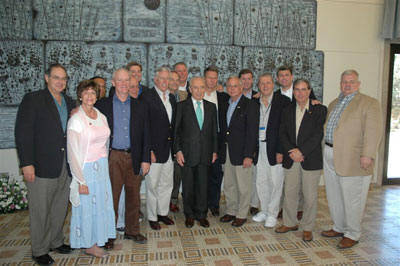 The
President noted that the Prime Minister is conducting serious
negotiations with Abu Mazen in order to reach an agreement and added
that “Israel must not take part in the internal Palestinian political
game. We must not be like the Chief Rabbinate and marry the Palestinian
factions and also not be a Las Vegas which arranges quick divorces
between them.” The President added that two parallel negotiation tracks
must be
The
President noted that the Prime Minister is conducting serious
negotiations with Abu Mazen in order to reach an agreement and added
that “Israel must not take part in the internal Palestinian political
game. We must not be like the Chief Rabbinate and marry the Palestinian
factions and also not be a Las Vegas which arranges quick divorces
between them.” The President added that two parallel negotiation tracks
must be 